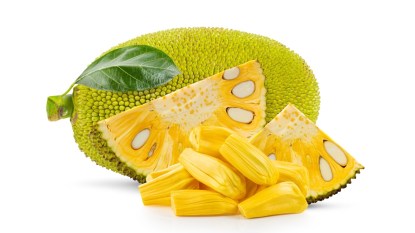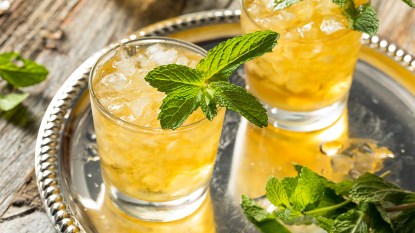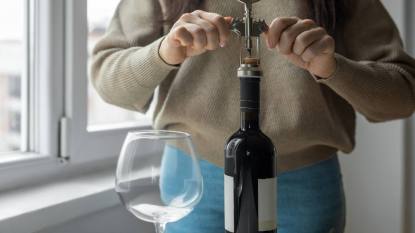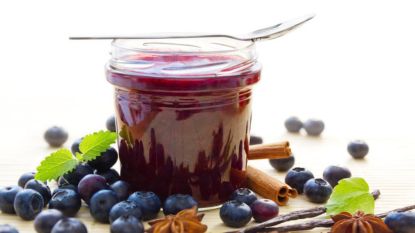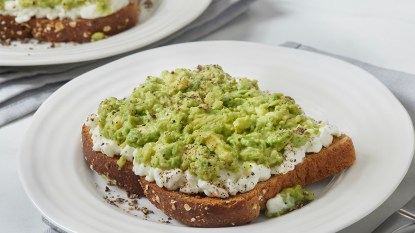Study After Study: Having a Glass of Wine With Dinner Can Powerfully Improve Health
The right amount of wine can help you lose weight, boost memory and more — cheers!

Is there a better way to celebrate any occasion than with a glass of wine paired with a delicious meal? For many of us, a splash of vino is a small way to wind down after the stresses of the day — but this simple after-dinner reward feels like even more of a treat when you realize all the wonderful effects a little tipple can have. The health benefits of wine after dinner are numerous, so pour another glass and keep scrolling to learn more about all the ways in which red wine can heal your body. Trust us, there’s plenty to cheers about!
1. Red wine may lower blood sugar levels
For people with type 2 diabetes, the secret to lowering blood sugar may rest in a nice glass of wine. In an October 2015 study published in the journal Annals of Internal Medicine, researchers found that people with type 2 diabetes who drank a glass of red or white wine at dinner had lower glucose levels than those who drank water instead. This isn’t the first study to find that wine has a correlation with good blood sugar, either.
The study analyzed 224 participants with controlled type 2 diabetes. Participants of the study were randomly assigned to drink either 5 ounces of mineral water, white wine or red wine after dinner every night for two years. All participants were following a healthy Mediterranean diet with no calorie restrictions. (Want to try eating this way for yourself? Click through for a Mediterranean diet sample menu.)
In the end, researchers found that red wine drinkers had a modest improvement in high-density lipoproteins (HDL), aka the “good” cholesterol. Those who drank red or white wine also saw a slight improvement in glucose metabolism. “Obviously excess drinking is harmful, but there is no good evidence to discourage moderate consumption among diabetics who have no other contraindication,” said study researcher Meir Stampfer, MD.
Related: The Vodka Trick That Gets Red Wine Stains Out of Clothing — Even After It Dries
2. A glass of wine could help you shed pounds
While consuming alcohol is typically associated with weight gain, a March 2010 study found the opposite to be true. Researchers tracked about 20,000 participants for almost 13 years, and by the end of the study, many of the women had gained weight. But here’s a surprise: The group that packed on the most pounds during the study were people who abstained from drinking, gaining an average of 8 pounds. Conversely, women who drank more than 30 grams (just over 1 ounce) of alcohol per day on average gained only 3.4 pounds. (Click through to find out how wine also reverses fatty liver to help speed your metabolism.)
“Our study results showed that middle-aged and older women who have normal body weight initially and consume a light-to-moderate amount of alcohol could maintain their drinking habits without gaining more weight compared with similar women who did not drink any alcohol,” Lu Wang, PhD, one of the researchers from the study, told Reuters Health.
Red wine is also full of resveratrol, an antioxidant plant compound that helps correct insulin resistance and manage a healthy weight. “Resveratrol has an impressive résumé for a lot of things, from taming inflammation to protecting against some cancers,” says Jonny Bowden, PhD. “And recent evidence has expanded this résumé to include the potential to fight weight gain and related problems like diabetes.”
3. Moderate wine consumption could help prevent colds
Wine is full of health benefits, but did you know that red wine can boost the immune system? In a May 2002 study published in the American Journal of Epidemiology, doctors found that the health benefits of drinking a moderate amount of wine include developing immunity against 200 viruses that trigger one of the most annoying ailments out there: the common cold.
The study, which included more than 4,000 faculty members and administrative staff at five Spanish universities, asked participants to keep a diary noting any colds they developed during the year. Results of the study found that people who had more than 14 glasses of wine per week had a 40 percent lower risk of contracting a cold than those who drank less. Cheers to that!
4. Red wine may keep your memory sharp
It seems counterintuitive that red wine could be the secret to staying mentally sharp, but that just might be the case. In a March 2012 review published in the journal Psychiatry Investigation, researchers looked at all studies published between 1971 and 2011 that explored the effects of alcohol on cognition. They found that there is some evidence suggesting low to moderate drinking in the elderly “protects against cognitive decline and dementia.” However, the review’s authors caution that more research needs to be done to determine the exact drinking pattern that results in optimal protection for older adults against dementia and cognitive decline.
In a 2010 study published in the journal Acta Neurologica Scandinavica, researchers tracked 5,033 stroke-free men and women for seven years to see what effect the consumption of alcohol had on cognition. The results showed that for both men and women, moderate wine consumption resulted in a better performance on cognition tests. Women who abstained from alcohol actually performed slightly worse on tests than did their peers who drank.
5. Wine may aid in dental health
If you like sweet red wines, it may come as a surprise to you that your sugary drink could actually prevent tooth decay. Red wine has antibacterial properties, which means fewer bacteria can attack your pearly whites. In a May 2014 study published in the Journal of Agricultural and Food Chemistry, researchers looked at whether red wine and other compounds could fight off cavity-causing bacteria. They grew bacteria cultures that are responsible for biofilm (a community of hard-to-kill bacteria), and then dipped the biofilm in different liquids, including red wine, red wine without alcohol, red wine spiked with grape seed extract and water with 12 percent ethanol. The results showed that red wine with or without alcohol, and wine with grape seed extract, both fight off bacteria.
“This study is about applying something to the teeth that decreases bacteria,” says dentist Gary L. Glasband, DDS. “The effectiveness of this type of product [red wine] depends on how long it stays on the tooth, known as its ‘substantivity.’ Wine has a high substantivity, which you can see as it stains the teeth when you drink it.” Who knew pesky wine stains on teeth were actually an indicator that your vino was hard at work warding off cavities? (And wine isn’t the only tasty sipper that’s good for your teeth — click through to see how drinking cranberry juice can also help you avoid tooth decay.)
6. Wine is linked to a lower risk of developing prostate cancer
This next bit of news is the perfect excuse for men to imbibe: In a 2018 meta-analysis published in the journal Clinical Epidemiology, researchers reviewed 17 studies to determine whether wine consumption affected a man’s risk of prostate cancer, focusing specifically on white versus red wine. The researchers looked at results from 611,169 patients and found that consuming a moderate amount of white wine increased a person’s risk of developing prostate cancer, while a moderate amount of red wine protected a person against developing prostate cancer.
7. Moderate amounts of wine could be good for your heart
The antioxidants in red wine may lead to higher levels of HDL cholesterol, which is the good cholesterol that protects your heart. And in moderation, red wine may also help thin blood to prevent blood clots. In a 2009 paper published in the International Journal of Angiology, the authors questioned whether it was appropriate for doctors to prescribe red wine as a treatment for cardiovascular disease (CVD).
They concluded that “regular and moderate consumption of red wine, perhaps one or two drinks a day with meals, should be encouraged… This would lead to a decreased incidence of CVD as well as other pathologies such as hypertension, peptic ulcer disease, respiratory infections, cholelithiasis, nephrolithiasis, macular degeneration, Alzheimer’s disease and even cancer. It may even improve our cognitive function.” (Click through to learn how wine can ward off osteoporosis without drugs, too.)
Have you finished your wine while reading about its wonderful benefits? Well, stand up, pour another glass, and drink up (in moderation, of course). Who knew being healthy could be so delicious?
To learn more about wine:
Just Bought a New Bottle of Wine? Follow These 5 Steps When Tasting It for the First Time
Can Moderate Red Wine Intake Positively Affect Your Gut Bacteria?
What is Orange Wine? (Expert Answers 5 Common Questions About This Drink)
This content is not a substitute for professional medical advice or diagnosis. Always consult your physician before pursuing any treatment plan.





